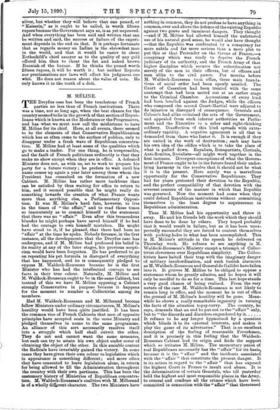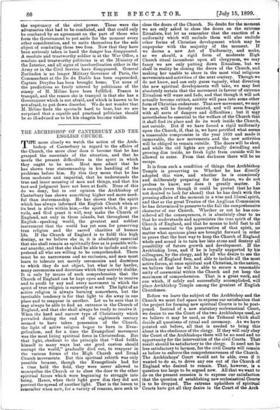M. MELINE. T HE Dreyfus case has been the touchstone of
French parties no less than of French institutions. There was a time, not so long ago, when the best chance for the country seemed to lie in the growth of that section of Repub- licans which is known as the Moderates or the Progressives, and has what we must now call the misfortune to have M. Moline for its chief. Here, at all events, there seemed to be the elements of that Conservative Republicanism which has so often come to the surface of politics, only to disappear under a fresh wave of Republican concentra- tion. M. Moline had at least some of the qualities which go to make a leader. For one thing, he is irrepressible, and the fault of French politicians ordinarily is that they make no show except when they are in office. A. defeated Minister does not, as with us, set to work to prepare his party for a future victory ; he prefers to wait until his name comes up again a year later among those whom the President has consulted on the formation of a new Cabinet. M. Maine has rather more backbone than can be satisfied by thus waiting for office to return to him, and it seemed possible that he might really do something towards the creation of what France wants more than anything else, a Parliamentary Opposi- tion. It was M. Meline's hard fate, however, to live in the times of "the affair," and to read those times so inaccurately as to commit himself to the statement that there was no "affair." Even after this tremendous blunder he might perhaps have saved himself if he had had the courage to own himself mistaken. He might have stood to it, if he pleased, that there had been no "affair" at the time he spoke. Nobody foresaw, in the first instance, all the developments that the Dreyfus case has undergone, and if M. Mane had professed his belief in its reality at any of the later stages, his previous scepti- cism would have been forgotten. He has preferred to go on repeating his pet formula in disregard of everything that has happened, and he is consequently pledged to oppose M. Waldeck-Rousseau because he is the first Minister who has had the intellectual courage to see facts in their true colour. Naturally, M. Mdline and M. Waldeck-Rousseau ought to be in the same Cabinet, but instead of this we have M. Meline opposing a Cabinet strongly Conservative in purpose because it happens for the moment to number a Collectivist among its members.
Had M. Waldeck-Rousseau and M. Millerand become fellow Ministers under ordinary circumstances, M. MOline's hostility would have been quite justified. It has been the common vice of French Cabinets that men of opposite principles have accepted seats in the same Ministry and pledged themselves in name to the same programme. An alliance of this sort necessarily resolves itself into a struggle which half shall outwit the other. They do not and cannot want the same measures, but each can try to attain his own object under cover of obtaining the object of the other. In this amiable contest the Radicals have invariably gained the victory. In some eases they have given their own colour to legislation which in appearance is something different ; and more often they have consented to leave legislation alone, in return for being allowed to fill the Administration throughout the country with their own partisans. This has been the customary history of Ministries of Republican concentra- tion. M. Waldeck-Rousseau's coalition with M. Millerand is of a wholly different character. The two Ministers have nothing in common, they do not profess to have anything in common, over and above the defence of the existing Republic against two grave and imminent dangers. They thought —and if M. Moline bad allowed himself the unfettered use of his natural good sense, he would also have thought —that the Republic was confronted by a conspiracy far more subtle and far more serious than a mere plot to put this or that Pretender on the throne of France,—a, conspiracy which was ready to deprive the French judiciary of its authority, and the French Army of that higher discipline which secures the subordination not merely of the men to their officers, but of officers and men alike to the civil power. For months before M. Waldeck-Rousseau took office, these main founda- tions of social order had been openly assailed. The Court of Caseation had been treated, with the same contempt that had been meted out at an earlier stage to the Criminal Chamber. Accusations of every kind had been levelled against the Judges, while the officers who composed the second Court-Martial were adjured to do injustice in disregard of consequence. Generals and Colonels had alike criticised the acts of the Government, and appealed from such inferior authorities as Parlia- ment and the Executive to a sober and right-thinking soldiery. Disaffection of this kind spreads with extra- ordinary rapidity. A negative agreement is all that is demanded from those who foster it. It is enough if they are united in the work of destruction ; each may have his own idea of the edifice which is to take the place of what is pulled down. Royalists, Bonapartists, Clerical; Anti-Semites, Socialists—all might work together in the first instance. Divergent conceptions of what the Govern- ment of France ought to be in the future found their under- lying harmony in the resolve that it should not be what it is in the present. Here surely was a marvellous opportunity for the Conservative Republicans. They had for years protested their devotion to the Republic, and the perfect compatibility of that devotion with the severest censure of the manner in which that Republic was governed. Now the moment had come when they could defend Republican institutions without committing themselves in the least degree to acquiescence in Republican administration.
Thus M. Melina had his opportunity and threw it away. He and his friends left the work which they should have done to be done by others. They hoped probably that it would result in failure, but as it has been unex- pectedly successful they are forced to content themselves with picking holes in what has been accomplished. This is M. Mdline's attitude in the speech he delivered on Thursday week. He refuses to see anything in M. Waldeck-Rousseau's Ministry except a triumph of Collec- tivist cleverness over Republican simplicity. The Collec- tivists have baited their trap with the imaginary danger of military insubordination, and such foolish alarmists as M. Waldeck-Rousseau and General de Gallifet have fallen into it. It grieves M. Moline to be obliged to oppose a statesman whom he greatly admires, and he hopes it will only be needful to do so for a time. This last hope stands a very good chance of being realised. From the very nature of the case M. Waldeck-Rousseau is not likely to remain long in office, and the moment he is out of office the ground of M. Mdline's hostility will be gone. Mean- while he shows a really remarkable ingenuity in turning the facts of the situation topsy-turvy. The country, he says, demands that an end be put not to the "affair" only, but to "the discords and disorders engendered by it It refuses to be any longer hypnotised. by a question which blinds it to its external interests, and makes it play the game of its adversaries." That is an excellent description of the feeling of reasonable Frenchmen. and it is precisely in this feeling that the Waldeck. Rousseau Cabinet had its origin and finds the support which so irritates M. Maine. The momentary union of real Republicans necessarily has the "affair " for its basis, because it is the " affair " and the incidents associated with the " affair " that constitute the present danger. It is its action in regard to the " affair " that has exposed the highest Court in France to insult and abuse. It is the determination of certain Generals, who till yesterday held the highest and most responsible places in the Army, to conceal and condone all the crimes which have been committed in connection with the " affair " that threatened adversaries that had to be combated, and that could only be combated by an agreement on the part of those who form the Government to put aside for the moment every other consideration, and to unite themselves for the sole object of combating these two foes. Now that they have been seriously taken in hand the danger has disappeared. A resolute and trustworthy soldier is at the War Office, a resolute and trustworthy politician is at the Ministry of the Interior, and all signs of insubordination either in the Army or in the Civil Service have disappeared. General Zurlinden is no longer Military Governor of Paris, the Commandant at the Ile du Diable has been superseded, Captain Dreyfus has been brought home. Yet none of the predictions so freely uttered by politicians of the stamp of M. M6line have been fulfilled. France is tranquil, and the reason she is tranquil is that she has a Government which is not afraid, and which is known to be not afraid, to put down disorder. We do not wonder that M. Meline finds the spectacle hard to bear, but we are surprised that a capable and practised politician should be so ill-advised as to let his chagrin become visible.







































 Previous page
Previous page